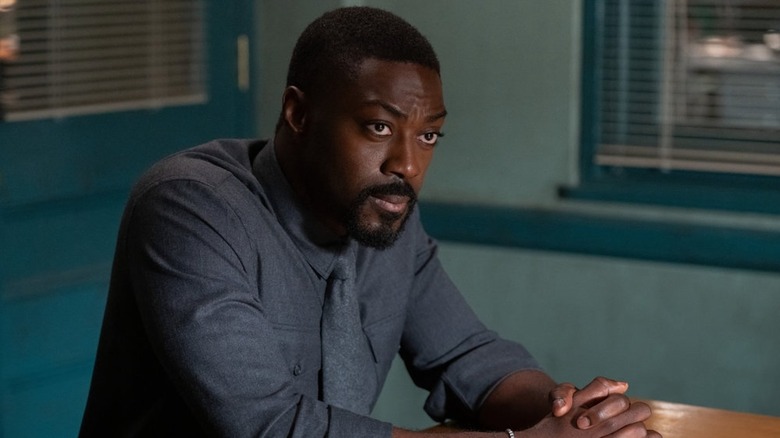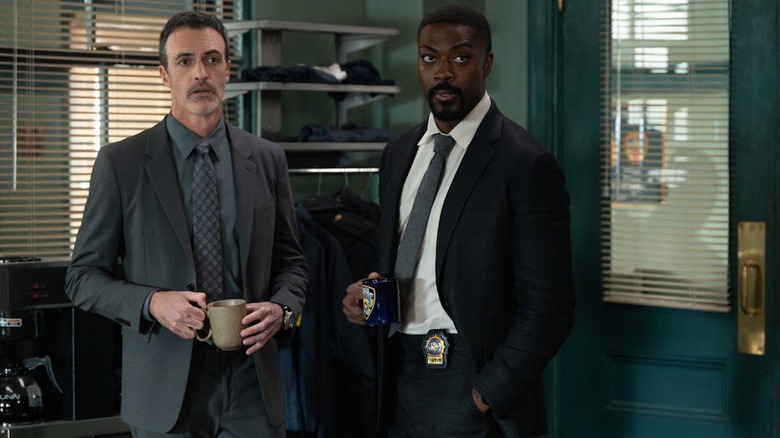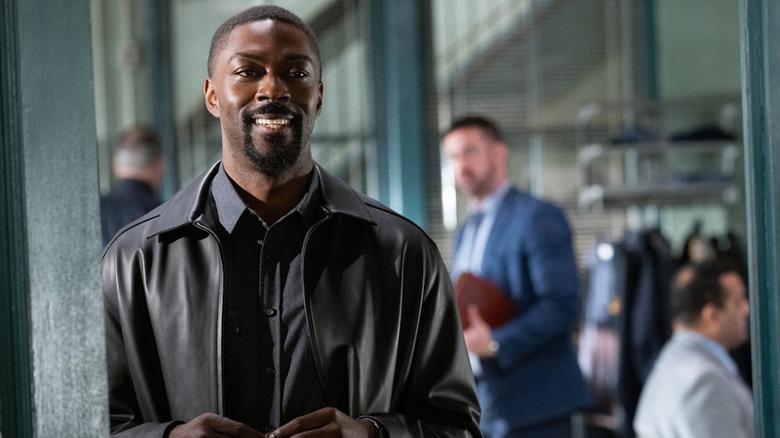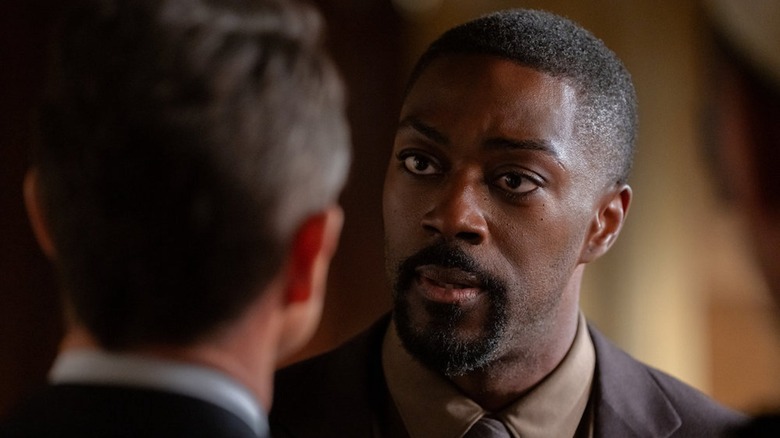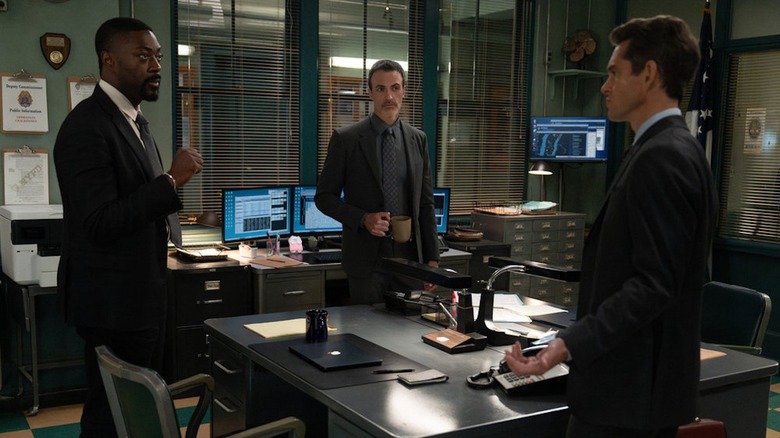Law & Order's Newest Cop Isn't Here To Make Friends: David Ajala Introduces Us To Det. Theo Walker
Det. Theo Walker, welcome to the 2-7.
David Ajala made his "Law & Order" debut Thursday, joining Lt. Brady's squad as it investigated the murder of a high school basketball player destined for the NBA. After new partners Riley and Walker (Ajala) uncovered the killer — the teen's manager, who happened to be his adoptive father — they then had to figure out whether the dad was lying when he said he acted in self-defense.
Walked eventually found some security-camera footage he was sure would exonerate the young man... but it actually proved that the kid was capable of violent rage. Still, the father was definitely lying about his motives for beating the teen to death, so Walker chose to lie to Assistant District Attorney Nolan Price and say that the tape didn't show anything of note.
After the man was convicted of second-degree murder, Riley confronted his partner: He'd found the security footage, too, and knew that Walker had lied about what it depicted. "I did what I thought would be best," Walker said, adding that he hadn't broken any laws. Riley agreed that justice had been served, but issued the new guy a gentle warning for the future: "I don't do the lone wolf thing. So either we do this thing together, or you gotta find a different partner."
I spoke with Ajala, whose TV credits include Star Trek: Discovery and Supergirl, about Walker's orientation to the squad. "He's not in the business of making friends, but he is respectful," he told me near the start of our conversation. "But if he has an opinion about something, he will let it be known."
Read on for more of Ajala's thoughts on joining the mothership NBC procedural.
'Wonderful and cathartic at the same time'
TVLINE | Theo has opinions on the people he encounters, and he's not afraid to let them be known. Talk to me about coming into a character who clearly has thoughts and opinions, right from the jump.
DAVID AJALA | It's a very great episode to introduce a character. Law & Order has been around for many, many years. It's iconic in so many ways. And with a character like Theo, he's all about just starting as you mean to go on, right? So he's not in the business of making friends, but he is respectful. But if he has an opinion about something, he will let it be known.
I've had to really take time to make sure that when he does have an opinion, it's coming from a place of passion, not just somebody who's egotistical. But having that freedom to play a character that can go against the grain has been wonderful and cathartic at the same time. I love it.
TVLINE | He was in Narcotics, so he's not coming in as a newbie.
He's been with Narcotics for years... When you see his first episode, he's probably been with [Brady's squad] for a month, maybe. So it's very early on, and he's thrown into the deep end. He does have transferable skills, from being a narcotics officer, but he also has to figure out his way of doing policing. So he watches Riley sometimes, to see how Riley navigates certain situations. And in his mind, he's thinking, "OK, that's a good way of doing that," or "I'm gonna do it my way next time."
'We're not trying to have the token Black detective guy'
TVLINE | He advocated for the teenager, though unfortunately, we found out the kid was kind of a violent person. I feel like when you have a staff made up mostly of white cops, you need someone who says, "Hey, maybe we look at this from the other side." But at the same time, I'd imagine you don't want to be the character that's always having to voice that. So did you have any conversations with the show about that kind of thing? You're replacing Mehcad Brooks, who also played a Black detective. How do you not have that just be a slot to fill?
That's a great question. Great, great question. What was first important for me was, there had to be qualities that felt very human, period. And he just so happens to be a detective, and he just so happens to be Black, a male, whatever it may be. So I wanted to really find those qualities.
At the same time, the optics of it is the Black detective fighting for a young Black guy... But then we also need to see how this guy — who has empathy — how he responds to other people who are victims of circumstances or whatever. So it has to be that same empathy that carries across race, gender, religion, whatever it might be. And thankfully, throughout the season, we do see that. That's very important. We're not trying to have the token Black detective guy. I'm not interested in that. I'm so happy that you raised that question. It's a very good question.
TVLINE | Thanks for engaging with it. Now let's talk about how I love that I can't quite tell what he thinks of Brady and what she thinks of him. What can you tease about that, as the season progresses?
[Laughs] I'm thinking about an episode, Episode 9. Very juicy — what you just mentioned about Brady and Walker. And the thing is, it's not anything that's confrontational. It's not that at all. But there's an energy behind what is not said and what is not communicated, and that will become a little clearer in Episode 9.
'Are these our guys, or are these, like, the cop-cops?'
TVLINE | What else do we know about him? Do we see anything about his background or family? I'm just thinking about the episodes that we're shooting... We haven't got into his backstory, in terms of like family and this, that and the other. The one thing we do know is: He's not a romantic kind of person. And he shuts it down because he's protecting something.
TVLINE | I noticed that he's very adaptable, depending on who he's talking to, right? He comes in hard with some of the suspects, softer with others. What about him, do you think, makes him able to do that with ease?
So here's the thing: Him being a narcotics guy, he's in many situations where he has to code-switch, and he has to be very believable with what he's doing. So, my thing was like, he is incredible at his craft, not because he's egotistical, but he has to be very convincing if he's gonna be in the projects, speaking with this person or that person. The reason why he has to be so good is because, if he's in a situation and somebody's like, "No, man, I don't believe that you're a cop," his life is on the line. So he has to be that good.
TVLINE | You guys shoot outside, on location in New York City a lot. Have you had any experiences with —
Have we?! [Laughs] Have we, Kim?! We were talking about one that happened last Friday.
TVLINE | What happened?
We were shooting a crossover episode. It's [Reid Scott], myself, and ["Law & Order: SVU" star] Ice-T, who was great to work with, and we're shooting the scene, right? We're in the middle of Manhattan, and there were two individuals who were having — it's a little sad, I'm sure they must have been on some hard drugs, right? But they were just bugging out and going crazy on the street, shouting, screaming, throwing themselves on the floor and rolling around screaming. And then the police came. It was just, it was a lot. [Laughs]
'Game recognizes game, for sure'
TVLINE | So wait, the real police rolled up while the fake police were shooting outside?
[Nods] So when they were running towards us, I was thinking, "Man, are these our guys, or are these, like, the cop-cops?" You can't make this up. [Laughs]
TVLINE | There's that moment at the end of the first episode where Riley is like, "I know you lied, I would have come to the same conclusion, but we need to work together." For Walker, is that an instant where game recognized game, or does it take a while for them to get to a good place?
I think the two can exist at the same time. I think game recognizes game for sure. And then it's also like, all right, we're covering ground. These are baby steps heading toward the right direction.
What did you think of Det. Walker's first episode? Tell us all your thoughts in the comments.
